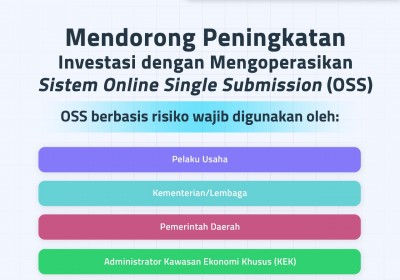Govt Continues to Seek Improvements to Help Attract Investment
September 06, 2021
JAKARTA – The Covid-19 pandemic still rages on, resulting in the government needing to readjust its foreign direct investment (PMA) and domestic direct investment (PMDN) targets to Rp 858.5 trillion in 2021, from the previous goal of Rp 991.3 trillion. The total amount of all investments realized in the first semester of 2021 reached Rp 442.8 trillion, or 49.2% of the set target.
This performance is supported by the investment realization from the processing industry of which in the first semester of 2021 reached 37.7% of its total investment target, more than the 32.2% reached in the previous period.
The government continues to find ways to increase the amount of investment coming into Indonesia through efforts such as easing business and operational permit acquisition. They have monitored investment licensing issues by involving all related ministries and institutions and encouraged the integration of the Online Single Submission (OSS) service with these parties.
As a result, the amount of micro, small and medium scale businesses (UMKM) that have received business identification numbers (NIB) through the OSS reached 3.1 million, between 9 June 2018 and 30 June 2021.
Since the OSS was introduced, the National Investment Coordinating Board (BKPM) have issued 36,629 NIBs. A majority of these NIBs were given to UMKMs, with micro businesses receiving 35,980 NIBs, small businesses at 506 and mid-size businesses at 66.
"If we keep this up, I believe that investment for our UMKMs will continue to rise," said President Joko "Jokowi" Widodo during the OSS online launch event on Monday (9/8).
The President explained that the purpose of the OSS is to cut the red tape infamously associated with permit acquisition. The OSS thus provides an equal standard for all government levels that issue permits, from central to regional.
The risk-based OSS system is an implementation of government decree (PP) no. 5/2021 concerning the Implementation of Risk-Based Business Licensing; a derivative rule from Law no.11/2020 on Job Creation.
The risk-based OSS system is primarily used by business actors, ministries, government agencies, regional governments, special economic zone administrators and free port free trade zone operators.
Indonesia’s Research Institutions Supporting the Development of the Electric Vehicle Industry
Indonesian Muslim Fashion and Cosmetics IKMs Shine at Dubai World Expo 2020
Govt Steps Up UMKM Transformation Efforts in the Midst of Pandemic Slowdown
Govt Encourages Promotion of IKM Products in Digital Era
Government Begins Developing Maritime Training Center in Makassar
Tweets by IDDevForum
